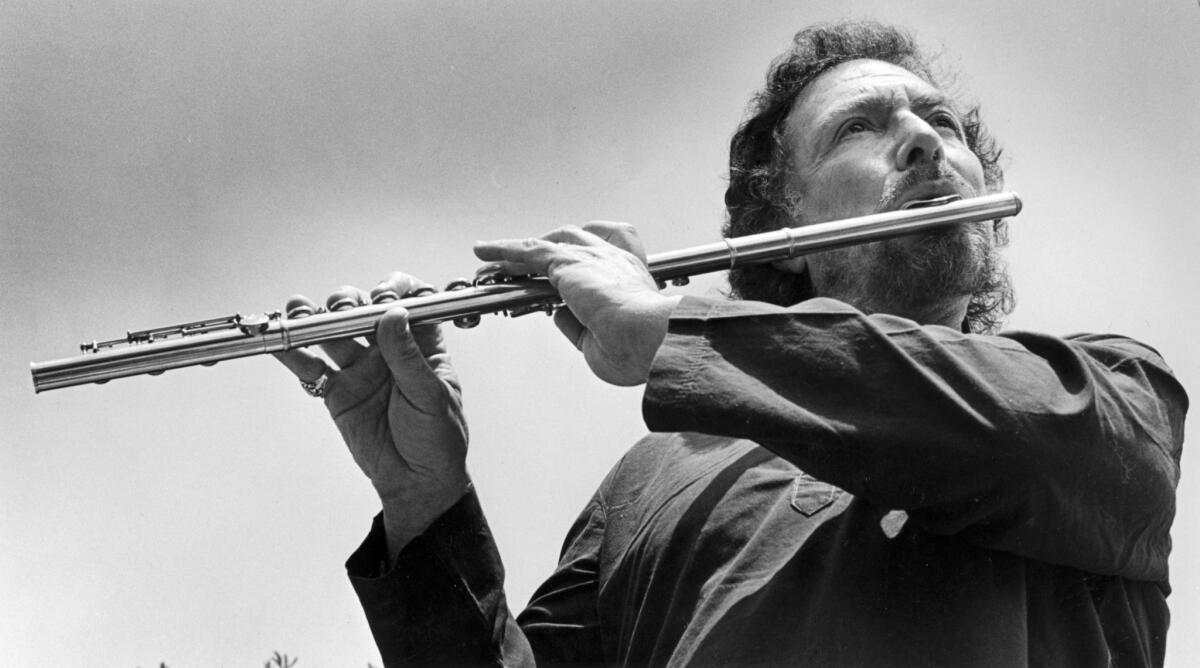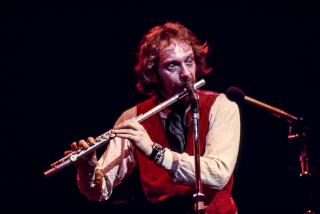Paul Horn dies at 84; Grammy winner was a pioneer of New Age music

- Share via
Paul Horn, a Grammy-winning alto saxophonist and flutist whose career reached from mainstream contemporary jazz to pioneering efforts in music that came to be known as New Age, has died. He was 84.
Horn died June 29 at his home in Vancouver, Canada, after a brief illness, according to his son Marlen.
Over the course of his long career, Horn performed or recorded with Frank Sinatra, Duke Ellington, Tony Bennett, Nat “King” Cole and Miles Davis.
But he was especially noteworthy for his cultural internationalism and his fascination with the meditative and spiritual aspects of music.
Horn performed in the Soviet Union and the People’s Republic of China in the late 1970s and early ‘80s, at a time when jazz was rarely heard in those nations.
An even more unusual encounter took place in 2001, when he played his flute in interactive fashion with a pair of orcas for the book and video “Haida and Paul Horn: The Adventures of a Killer Whale and a Jazz Musician.”
In his autobiographical book “Inside Paul Horn: The Spiritual Odyssey of a Universal Traveler,” he wrote: “We are journeying externally from country to country. We are traveling in historical time, from the present to the distant past. We are traveling inwardly as well, through the music of meditation.”
In his “Inside” albums, Horn recorded, mostly as a flute soloist, in the spiritual environments of India’s Taj Mahal, Egypt’s Great Pyramid, Lithuania’s Kazamieras Cathedral, and, with Native American flutist R. Carlos Nakai, in Monument Valley. The recordings, made in settings that provided rich reverberations for Horn’s free improvisations, have become meditation staples.
Horn was not bothered by the fact that his “Inside” albums emerged in the forefront of New Age music in the late ‘60s and ‘70s.
“New Age music does something wonderful to the nervous system,” he said in a 1987 interview with The Times’ Zan Stewart. “It settles you down into a deep state of relaxation. When people want to ‘cool out,’ a [New Age] record will do it real quick. It’s meditative music.”
Horn was born on March 17, 1930, in New York City and grew up in Washington, D.C. He started taking piano lessons when he was 4 years old. At 10, he took up the clarinet, following with the alto saxophone at 12.
Horn received a bachelor’s degree in clarinet and flute at the Oberlin Conservatory of Music in Ohio, and a master’s degree from the Manhattan School of Music.
After establishing himself in New York as a versatile, much-in-demand woodwind artist, Horn moved to Los Angeles in the 1950s and joined the Chico Hamilton Quintet, replacing flutist and woodwind artist Buddy Collette. The group, which featured arrangements blending jazz rhythms with the timbres of cello and flute, was an early advocate of what came to be labeled New Age music.
In addition to his high-visibility appearances with Hamilton, Horn spent his Los Angeles years as a free-lance, first-call studio musician whose work included recordings for film and television. Eventually, he became a member of the NBC Staff Orchestra.
He also acted in films such as “The Rat Race” and “Sweet Smell of Success” and was the subject of a David Wolper television documentary, “The Story of a Jazz Musician.”
In 1966, his album “Jazz Suite on the Mass Texts” — one of his 50 recordings — was awarded a Grammy for best original jazz composition. Horn also received five other Grammy nominations.
Drawn to Eastern spiritual thinking, Horn became a disciple of the Maharishi Mahesh Yogi. In 1968, he was joined by the Beatles in his study of Transcendental Meditation with the Maharishi in India. He eventually became a teacher of meditation using T.M. techniques.
He also was a believer in the healing power of music.
“It’s made me want to keep on doing what I’m doing,” he told The Times after recovering from surgery for a brain abscess in 1990.
In addition to his son Marlen, Horn’s survivors include his wife, Ann Mortifee, son Robin, stepson Devon Mortifee, and four grandchildren.
More to Read
Start your day right
Sign up for Essential California for the L.A. Times biggest news, features and recommendations in your inbox six days a week.
You may occasionally receive promotional content from the Los Angeles Times.






